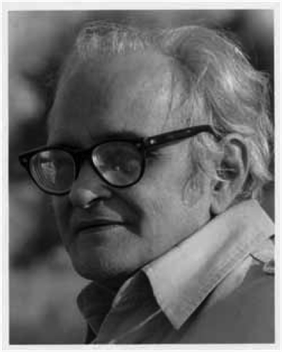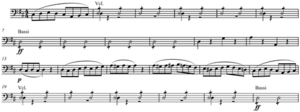Julián Orbón facts for kids
Julián Orbón de Soto (born August 7, 1925, in Avilés, Spain – died May 21, 1991, in Miami, Florida) was a famous Cuban composer. He lived and created music in several countries, including Spain, Cuba, Mexico, and the United States. A well-known American composer, Aaron Copland, once called Orbón "Cuba's most gifted composer of the new generation."
Life of Julián Orbón
Early Life and Music Beginnings
Julián Orbón was born in Avilés, Spain, on August 7, 1925. His father, Benjamín Orbón, was a composer and pianist. This meant Julián grew up surrounded by music. He started taking piano and basic music lessons from his father in 1932. When he was ten, Julián attended the Oviedo Conservatory. There, he received his first formal music training.
In 1938, Julián's family moved to Havana, Cuba. He continued his piano studies with his father. He also learned about composing from José Ardévol, a Cuban composer. Ardévol and Orbón's father helped start a group called Grupo de renovación musical. This group wanted to promote new Cuban music.
Musical Training and Career
When his father passed away in 1944, Julián Orbón became the director of the Orbón Conservatory. A year later, he won a special scholarship. This allowed him to study composing with Aaron Copland. He studied at the Berkshire Music Center in Tanglewood, Massachusetts.
After about a year, Orbón returned to Havana. He continued as director of the conservatory. However, the Cuban Revolution began in 1953. Because of this, Orbón left Cuba for good in 1960. He moved to Mexico City.
From 1960 to 1963, Orbón taught composing in Mexico City. He worked alongside Carlos Chávez, a famous Mexican composer. In 1964, Orbón moved to the United States. He taught at several colleges, including Lenox College and Columbia University. He lived in New York City for the rest of his life.
Later Years and Family
Julián Orbón passed away from cancer at age 65. This happened on May 21, 1991, in Miami, Florida. He left behind his wife, Mercedes, and two sons, Andres and Julián. His sister, Ana Abril, and two grandchildren also survived him.
Julián Orbón's Music and Achievements
Musical Style and Influences
Julián Orbón created music that blended different styles. He combined Spanish and Cuban sounds. He also used elements from Gregorian chant and African music. Early on, his music was influenced by composers like Manuel de Falla. They used a Spanish neoclassic style. This style can be heard in Orbón's works like Suite de Siete Canciones de Juan del Encina.
Orbón's music often had strong rhythms. It also showed intense and clear feelings. His piece Preludio y danza for solo guitar is a good example.
Later, Orbón became good friends with Copland, Chávez, and Villa-Lobos. Their friendship influenced his music. He started composing pieces that were less like the Spanish neoclassic style. His later music became more romantic and expressive. This change came from the sadness he felt after leaving Cuba.
Awards and Grants
Julián Orbón received many awards for his compositions. In 1954, he won the Juan Landaeta Prize. This was for his work Tres versiones sinfónicas. He won it at the First Caracas Latinamerican Musical Festival in Venezuela.
Orbón also received grants to help him compose. In 1958, he got a grant from the Koussevitzky Foundation. He used it to write Concerto grosso, one of his most popular pieces. He also received Guggenheim Fellowships in 1959 and 1969. These are special awards for talented people in the arts. In 1967, he received an award from the American Academy of Arts and Letters.
Works by Julián Orbón
Julián Orbón wrote many different kinds of music. These included orchestral pieces, vocal works, and music for solo instruments. He also adapted the words for the famous song "Guantanamera". The words came from a poem by José Martí. "Guantanamera" is Cuba's best-known song. José Fernandez Diaz wrote the original tune for it.
Orchestral Music
- Symphony in C (1945)
- Homenaje a la Tonadilla (1947)
- Tres versiones sinfónicas (1953)
- Danzas sinfónicas (1955)
- Concerto Grosso (1958)
- Partitas No. 3 (1965-1966)
- Partitas No. 4 (1982-1985)
Choral Music
- Crucifixus (1953)
- Introito (1967-1968)
- Canciones folklóricas (1970-1972)
- Liturgia de tres días (1975)
Solo Vocal Music
- Pregón (1943)
- Himnus ad galli cantum (1956)
- 3 cantigas del rey (1960)
- Libro de cantares (1987)
Chamber and Solo Instrument Music
- Homaje a Padre Soler (1942)
- Toccata (1943)
- Clarinet Quintet (1944)
- Preludio y danza (1950-1951)
- String Quartet (1951)
- Partita no. 1 (1963)
- Partita no. 2 (1964)
- Preludio y fantasia tiento (1974)
See also
 In Spanish: Julián Orbón para niños
In Spanish: Julián Orbón para niños
 | Charles R. Drew |
 | Benjamin Banneker |
 | Jane C. Wright |
 | Roger Arliner Young |



